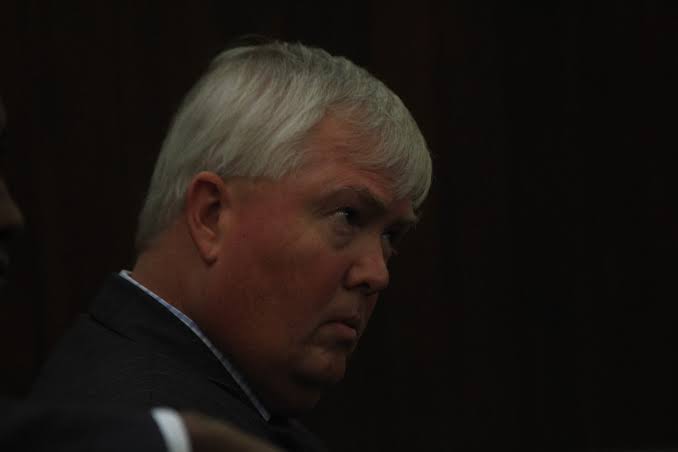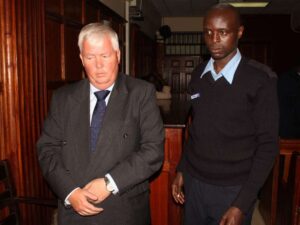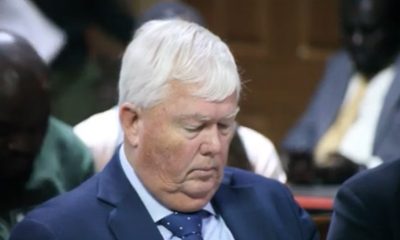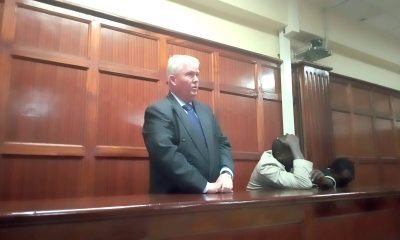News
Slippery British Lawyer Guy Elms Spencer Dodges Karen Land Fraud Charges Again as Questions Mount Over Decade-Long Legal Maneuvering
If he is innocent, he should welcome the opportunity to clear his name in open court rather than hiding behind procedural objections.

Guy Elms Spencer has become something of a legal phantom in Nairobi courtrooms, a British lawyer who appears to possess an almost supernatural ability to slip through the fingers of justice.
His latest escape act came last week when High Court Judge Martin Muya granted him a temporary reprieve from facing forgery charges in a Sh100 million Karen land fraud case, pushing the matter to October 13.
But this is merely the most recent chapter in what has become an embarrassingly protracted saga that raises uncomfortable questions about how well-connected foreign lawyers can game Kenya’s justice system.
The facts are damning.
Spencer stands accused of forging the will of a deceased British national, a crime that allegedly occurred more than a decade ago. Yet here we are in 2025, and the man has yet to enter a plea.
The case has been withdrawn, revived, delayed, appealed, and twisted through so many legal contortions that one might reasonably wonder whether Spencer’s true expertise lies not in law but in the dark art of procedural manipulation.
Consider the sheer audacity of his current position. After Magistrate Benmark Ekhubi rightly rejected yet another attempt by the Director of Public Prosecutions to withdraw the charges against him, Spencer had the temerity to rush to the High Court seeking to overturn that decision.
His argument drips with the kind of technical sophistry that gives lawyers a bad name. He claims the magistrate misdirected himself on the law, ignored a civil court judgment, and violated his constitutional rights.
This from a man who has been dodging his day in court for years.
The timing of the DPP’s withdrawal attempts deserves scrutiny. This is the second time Renson Ingonga’s office has tried to pull the plug on Spencer’s prosecution.
Magistrate Ekhubi, displaying the kind of judicial backbone that has been sorely lacking in this case, called out this pattern in language that should make every Kenyan sit up and pay attention.
He spoke of the DPP speaking from both sides of the mouth, of arbitrary and capricious decisions, of a system that appears designed to shield certain accused persons from accountability.
Spencer’s legal strategy reveals a man who understands that in Kenya’s overburdened courts, delay equals victory.
He points to a High Court judgment from June 2025 that dismissed similar forgery allegations regarding the same will, arguing that forcing him to face criminal charges amounts to double jeopardy.
But this conveniently ignores a fundamental principle of law that any first-year student understands. Civil and criminal proceedings serve different purposes, carry different standards of proof, and can proceed independently.
The magistrate made this crystal clear, yet Spencer persists in conflating the two.
What makes this particularly galling is Spencer’s invocation of constitutional rights. He claims his right to a fair trial is being violated, that he is being subjected to double jeopardy.
This is rich coming from someone who has avoided trial altogether through an endless succession of procedural gymnastics.
A fair trial means facing your accusers and letting the evidence speak. Spencer seems to prefer a different definition, one where fairness means never having to answer uncomfortable questions under oath.
The magistrate’s ruling laid bare what appears to be a systemic problem. The complainant, the actual victim in this case, was not consulted before the DPP attempted to withdraw charges.
This is not some minor procedural hiccup.
It suggests that decisions about whether to prosecute are being made in smoke-filled rooms rather than in the open court of law. It points to the kind of behind-the-scenes maneuvering that corrodes public confidence in the justice system.
Spencer’s defense team will no doubt paint him as a victim of prosecutorial overreach, a man caught in the crosshairs of a system that refuses to accept the findings of a civil court.

Guy Spencer Elms is battling mounting fraud cases in Nairobi and Kwale, with his alleged Freemason ties painting the picture of a lawyer who built power on forged papers and arrogance now facing the weight of justice.
But the public is entitled to ask harder questions. Why has it taken more than a decade to bring this case to trial? Who benefits from these endless delays? What influence does a well-connected British lawyer wield in Nairobi legal circles that allows him to repeatedly avoid the dock?
The alleged forgery involves property worth Sh100 million in Karen, one of Nairobi’s most exclusive neighborhoods.
This is not some trivial dispute over a garden fence. If Spencer indeed forged a will to fraudulently acquire such valuable property, he deserves to face the full force of the law.
If he is innocent, he should welcome the opportunity to clear his name in open court rather than hiding behind procedural objections.
Justice Muya’s decision to grant a temporary order halting the plea-taking is procedurally correct but practically frustrating. It means more delay, more legal fees, more time for memories to fade and witnesses to disappear.
It means the complainant must endure yet another period of uncertainty while Spencer’s lawyers craft their next objection.
The pattern is unmistakable.
File an application, get a temporary order, argue for months, lose, appeal, get another temporary order, and repeat. It is a strategy that works brilliantly in a system where judges are overworked, court files go missing, and the wheels of justice turn at glacial speed.
For a man facing serious criminal charges, time is the most valuable commodity, and Spencer has proven himself a master at buying it.
Magistrate Ekhubi deserves credit for seeing through the smoke and mirrors.
His insistence that Spencer must finally take a plea, his recognition that the DPP cannot simply withdraw cases at will without proper consultation, and his clear statement that civil proceedings do not bar criminal prosecution show judicial courage.
His ruling reflects an understanding that justice delayed is justice denied, not just for victims but for society as a whole.
Yet here we are, with Spencer having successfully deployed his legal nuclear option.
The High Court review application has given him exactly what he wanted, more time, more breathing room, more opportunity to work the angles.
October 13 will come, and if past is prologue, there will be another application, another technical objection, another reason why this British lawyer cannot possibly be expected to stand in a Kenyan court and answer for his alleged crimes.
The case raises broader questions about how foreign nationals, particularly those with legal training and connections, navigate Kenya’s justice system.
Does Spencer receive treatment that an ordinary Kenyan accused of similar crimes would never enjoy? Would a local lawyer have been allowed to drag out proceedings for over a decade? The uncomfortable answer seems obvious.
Kenya’s legal system prides itself on independence and fairness, on the principle that all are equal before the law regardless of race, nationality, or social standing.
The Spencer case tests that principle. If a British lawyer accused of forging a will worth Sh100 million can avoid trial for more than ten years through procedural warfare, what message does that send? It suggests that justice in Kenya is not blind but selective, that the scales can be tipped by those who know which levers to pull.
The prosecution now faces a critical test.
When the matter comes before Justice Muya on October 13, they must be prepared to counter Spencer’s arguments with equal vigor and superior evidence.
They must demonstrate why the magistrate’s decision was correct, why Spencer must finally face trial, and why the constitutional protections he invokes do not shield him from accountability for alleged criminal conduct.
More fundamentally, this case demands that we examine the systems and practices that allow such protracted delays. The DPP’s office must explain its pattern of attempting to withdraw charges in this matter.
The judiciary must find ways to prevent accused persons from indefinitely postponing justice through serial applications and appeals. Parliament must consider whether the procedural rules need tightening to prevent abuse by those with deep pockets and legal sophistication.
Guy Elms Spencer may ultimately prove innocent of the charges against him.
That is for a court to decide after hearing evidence and weighing testimony. But his innocence or guilt is almost beside the point now.
What matters is that a man accused of serious economic crimes has managed to avoid trial for more than a decade, making a mockery of the criminal justice system in the process.
Whether through his own legal brilliance or through the failure of prosecutors and courts to hold the line, Spencer has demonstrated that in Kenya, if you have the resources and the know-how, you can run out the clock on justice itself.
As October 13 approaches, Kenyans will watch to see whether this will finally be the day when Guy Elms Spencer stands before a court and enters a plea, or whether he will pull yet another rabbit from his legal hat.
The smart money, based on his track record, knows which way to bet. And that, more than any single case outcome, is the real scandal here.
Kenya Insights allows guest blogging, if you want to be published on Kenya’s most authoritative and accurate blog, have an expose, news TIPS, story angles, human interest stories, drop us an email on [email protected] or via Telegram
-

 Grapevine1 week ago
Grapevine1 week agoAlleged Male Lover Claims His Life Is in Danger, Leaks Screenshots and Private Videos Linking SportPesa CEO Ronald Karauri
-

 Lifestyle2 weeks ago
Lifestyle2 weeks agoThe General’s Fall: From Barracks To Bankruptcy As Illness Ravages Karangi’s Memory And Empire
-

 Grapevine4 days ago
Grapevine4 days agoRussian Man’s Secret Sex Recordings Ignite Fury as Questions Mount Over Consent and Easy Pick-Ups in Nairobi
-

 Investigations2 weeks ago
Investigations2 weeks agoEpstein Files: Sultan bin Sulayem Bragged on His Closeness to President Uhuru Then His Firm DP World Controversially Won Port Construction in Kenya, Tanzania
-

 Business2 weeks ago
Business2 weeks agoKRA Can Now Tax Unexplained Bank Deposits
-

 Investigations1 week ago
Investigations1 week agoEpstein’s Girlfriend Ghislaine Maxwell Frequently Visited Kenya As Files Reveal Local Secret Links With The Underage Sex Trafficking Ring
-

 News1 week ago
News1 week agoState Agency Exposes Five Top Names Linked To Poor Building Approvals In Nairobi, Recommends Dismissal After City Hall Probe
-

 Investigations19 hours ago
Investigations19 hours agoMulti-Million Dollar Fraud: Three Kenyans Face US Extradition in Massive Cybercrime Conspiracy
























